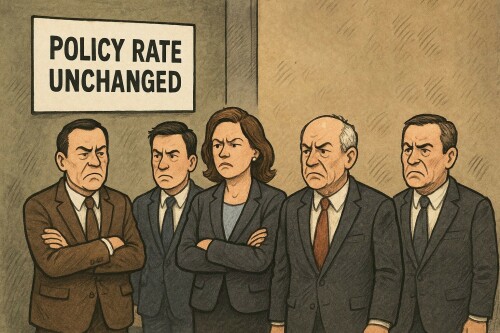Business Community Expresses Concern Over Unchanged Policy Rate
The business sector in Pakistan has voiced its worries regarding the central bank’s choice to maintain the policy rate at 11%. They claim this move has negatively impacted business confidence and created difficulties for industrialists, business owners, and investors.
The State Bank of Pakistan’s (SBP) Monetary Policy Committee (MPC) chose on Wednesday to keep the policy rate steady at 11%. This went against market forecasts, which had predicted a reduction of roughly 50 to 100 basis points (bps).
Federation of Pakistan Chambers of Commerce & Industry (FPCCI) President Atif Ikram Sheikh stated that according to official figures, the Consumer Price Index (CPI) was 3.2% in June 2025. However, the policy rate is still 11%, which is a 780 basis point premium over inflation. He added that this does not make economic sense.
Sheikh mentioned that after extensive discussions with all industries and sectors, the FPCCI had requested a substantial 500 basis point rate reduction during the MPC meeting on Wednesday to bring the key policy rate to a more reasonable level.
Pakistan Hosiery Manufacturers and Exporters Association (PHMA) Central Chairman Muhammad Babar Khan stated that keeping the key interest rate at 11% would be harmful to the expansion of exporters and manufacturers in various industries.
Khan noted that the policy rate remains elevated compared to the region, making it exceptionally difficult for exporters to increase exports further or compete with nations like Vietnam, Bangladesh, and India.
Key interest rate movement over the past year:
- [Details of rate changes over the last 12 months would be included here if provided in the original article]
Pakistan Chemicals & Dyes Merchants Association (PCDMA) Chairman Salim Valimuhammad also described the SBP’s decision as a setback for industrial expansion and business sentiment.
He contended in a statement that lower interest rates are essential for boosting economic activity, enhancing access to reasonably priced loans, and encouraging the creation of jobs.
He stated that, in his opinion, this is not a prudent choice, emphasizing the recent fall in inflation as a justification for lowering rates. He added that inflation has decreased, and businesses are under tremendous strain, and that if such high interest rates persist, the business community, which is already struggling, will face even more hardship.
According to data from the Pakistan Bureau of Statistics (PBS), Pakistan’s headline inflation for June 2025 was 3.2% year over year (YoY), which is lower than the 3.5% recorded in May 2025.
It rose by 0.2% month over month (MoM) in June 2025, compared to a 0.2% decline the previous month and a 0.5% increase in June 2024. CPI inflation averaged 4.49% during FY25, compared to 23.41% in FY24.
The PCDMA chairman stated that the government claims that inflation is falling, but the interest rate is still the same, and this policy inconsistency is hurting economic recovery.
Bilwani: Rationale to maintain interest rate neither convincing nor economically sound
Karachi Chamber of Commerce & Industry (KCCI) President Muhammad Jawed Bilwani stated that even with inflation at its present level or slightly higher, there was still plenty of opportunity to lower the interest rate to single digits, as many regional economies have done in similar or even more challenging economic situations.
He stated that by passing up this crucial chance to lower rates, the State Bank has not only dashed hopes for an economic recovery but also placed an ongoing and unnecessary burden on an already overburdened private sector, adding that the SBP’s action was harmful to domestic businesses, particularly small and medium-sized enterprises (SMEs) and manufacturers. It also runs the danger of further impeding economic recovery, job creation, and industrial revival.
He emphasized that monetary policy easing was being actively pursued across the region and in comparable economies to support growth.
Bilwani pointed out that India’s policy rate is 6.5%, Bangladesh’s is around 8.5%, Indonesia’s is 6.25%, and Vietnam has lowered its rate to below 5%, all of which are considerably lower than Pakistan’s.



Comments (0)
No comments yet. Be the first to comment!
Leave a Comment